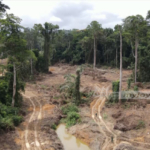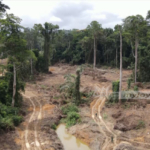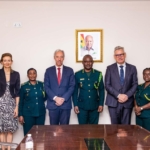
Civil society pressure group OccupyGhana, has again raised alarm over what it says is the government’s continued inaction on illegal mining (galamsey), warning that Ghana is edging dangerously close to an “ecological and food security disaster” that could devastate generations.
In an open letter to President John Dramani Mahama, copied to the Chief of Staff and media houses, the group expressed frustration that despite years of advocacy, meetings, and presidential commitments, “not a single concrete action” has been taken to stop the environmental destruction caused by galamsey.
The group’s latest communication, titled “Galamsey Reminder (No. 2) – The Imminent Ecological and Food Disaster,” marks the third anniversary of a similar open letter they sent to former President Nana Addo Dankwa Akufo-Addo on the same issue in 2022 — a letter which, according to OccupyGhana, “received no acknowledgement, no response, and no action.”
“We regret that both our letter dated 29 September 2025 and Reminder #1 dated 3 October 2025 to you have suffered a similar fate so far,” the statement read.
“We hope this second reminder will not fall into the same cycle of repeated talk but no action on this critical matter of national importance.”
A nation on the brink
OccupyGhana reiterated that the effects of galamsey have now reached crisis levels, threatening not only Ghana’s ecosystems but also its agriculture, food supply, and public health.
Citing research from NASA satellite data, the group said Ghana loses an estimated 2,600 hectares of forest annually—equivalent to the entire city of Kumasi being wiped out every decade.
“At this rate, the country is heading towards critical food insecurity,” the letter warned.
“The very process of unregulated mining leads to the loss of fertile topsoil, making farming in these areas nearly impossible.”
The group also drew attention to severe water pollution caused by mercury and cyanide used in small-scale mining operations, which they said are poisoning Ghana’s rivers, groundwater, and even the air.
A 2021 study by researchers from the Kwame Nkrumah University of Science and Technology (KNUST)found that mercury levels in parts of the Bonsa River near Tarkwa Nsuaem were up to 60 times higher than limits set by theGhana Environmental Protection Agency (EPA). Turbidity readings were also recorded at over 200 NTU, far above the World Health Organization’s (WHO) recommended safe level of 5 NTU.
“These figures,” OccupyGhana said, “must give the President sleepless nights and spur him to act.”
The broken promises
The statement reminded the President of his predecessor’s 2017 pledge that he had “staked his presidency on ending galamsey”, calling it a “betrayal of trust” that the scourge continues unchecked eight years later.
“We recall those words with optimism that you, Mr President, will rise to the occasion and rein in the irresponsible actions of those who seek to destroy this country. We hope you do it for God and country,” the group wrote.
OccupyGhana emphasised that despite several high-profile meetings, including presidential engagements with chiefs and local authorities, “no tangible progress has been made.”
Health and security threats
Beyond environmental degradation, the group warned of a looming public health emergency as mercury poisoning spreads in mining communities and possibly beyond.
“There are already reports of mercury poisoning in several mining areas, and the vapourised metal is being inhaled by miners,” they cautioned.
“With a national health budget already constrained, an epidemic of mercury poisoning is the last thing Ghana needs.”
The dumping of mining waste, OccupyGhana noted, has also contributed to flooding in mining districts, further endangering lives and property.
A call for urgent and decisive action
The group concluded with an impassioned plea for immediate, sustained, and transparent intervention to reverse the damage and prevent irreversible national collapse.
“The time for talk is over. The nation demands decisive action — now,” the group stressed. “Galamsey is not merely an environmental issue; it is a national survival issue.”
OccupyGhana reaffirmed its commitment to “occupying hearts and minds for God and country,” pledging to keep the issue in the public domain until the government takes visible and effective steps to restore Ghana’s forests, protect its rivers, and secure its food systems.
Galamsey—an informal term for illegal small-scale gold mining—has long plagued Ghana’s environment, contaminating rivers, destroying forests, and displacing farmers.
Despite numerous task forces and policy promises, illegal mining continues to thrive, driven by unemployment, political complicity, and high global gold prices.
Environmentalists warn that if the current rate of degradation persists, Ghana’s southern rivers could become undrinkable within a decade, while its northern farmlands face desertification due to soil erosion and deforestation.
- President Commissions 36.5 Million Dollars Hospital In The Tain District
- You Will Not Go Free For Killing An Hard Working MP – Akufo-Addo To MP’s Killer
- I Will Lead You To Victory – Ato Forson Assures NDC Supporters
Visit Our Social Media for More




